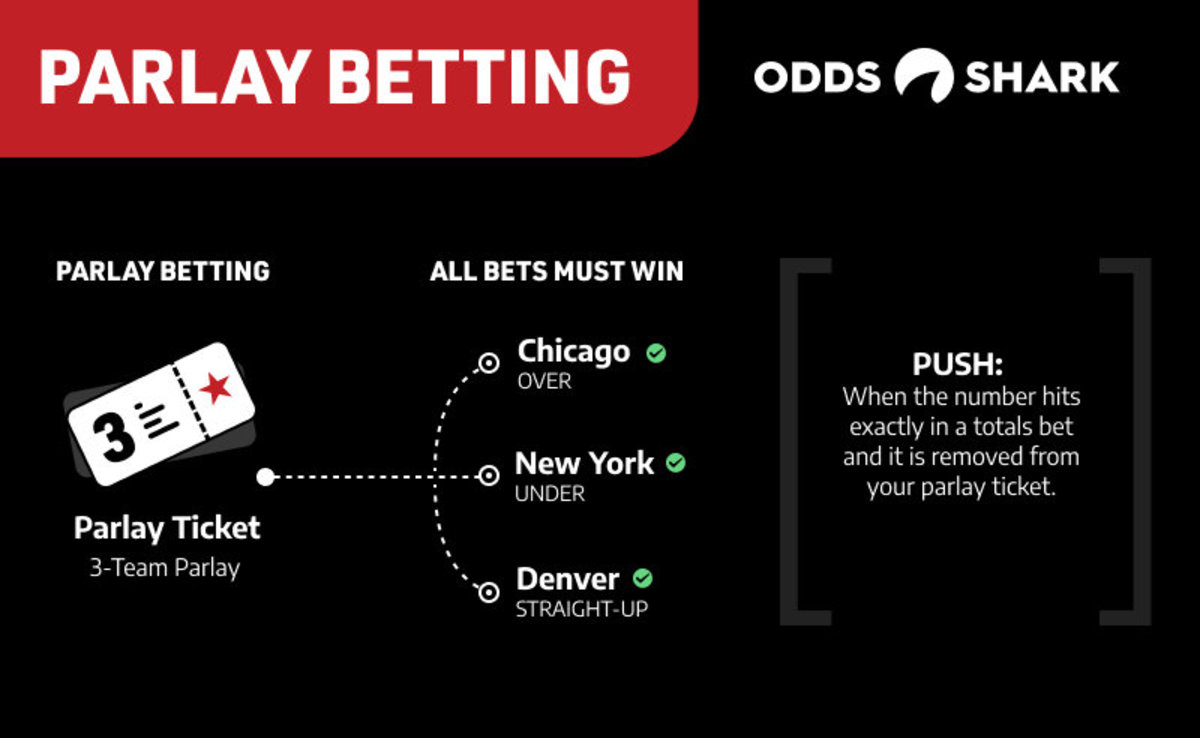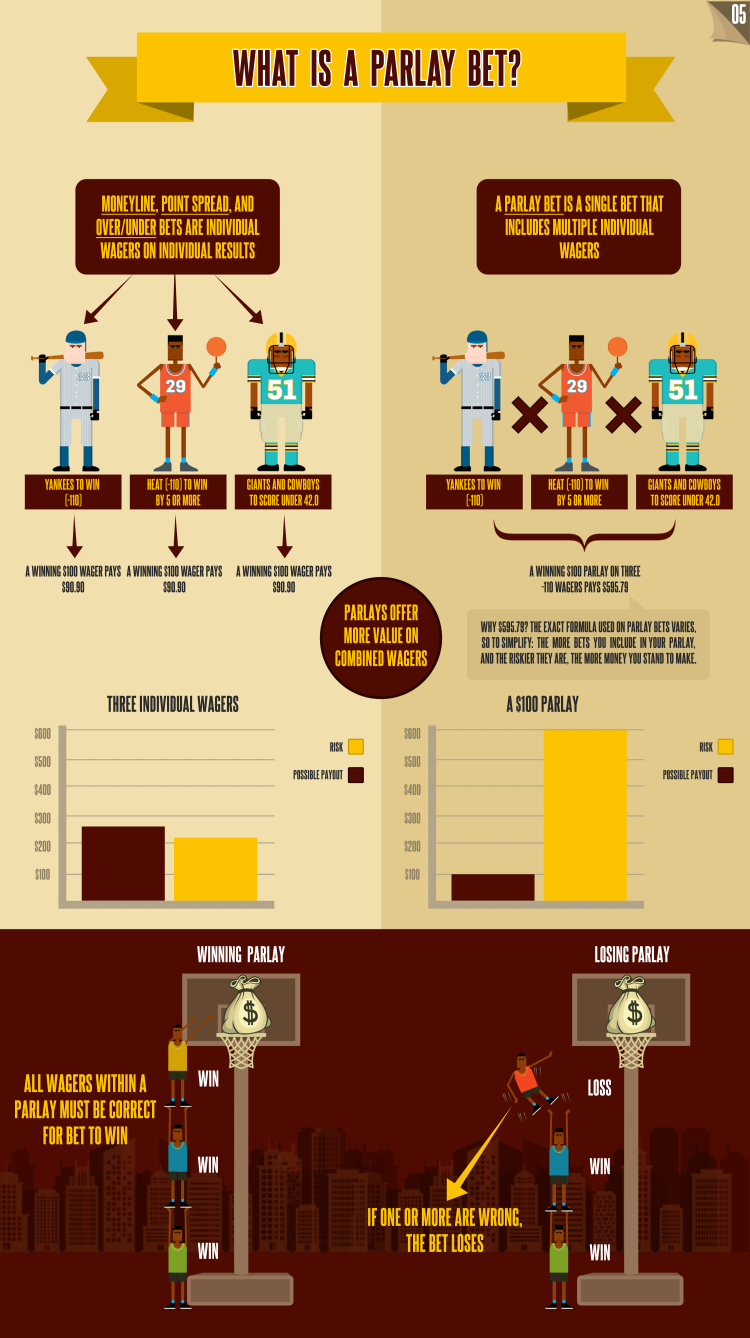Parley betting

All added bets must win in order for the parlay to win. If one selection in the parlay loses, the whole parlay loses. If a selection results in a push, it is. Discover parley betting best parlay bets with expert picks from Dimers. Enhance your betting strategy with our daily parlay picks and customizable parlay picker. What is Parlay Betting. Parlay betting is a common way to bet on sports that allows you to raise the stakes for larger payouts. To place a parlay bet, you can. A parlay is a single bet that links together two or more individual wagers for a high payout. A two-team parlay might pay 13/5, a three-team.
What is a parlay bet: how to calculate parlay odds
Parlay Bet: What It Is and How It Works
Any sportsbook will calculate potential winnings from a parlay and is often what gamblers rely on. To calculate a payout:. First, convert those odds to decimal, which is 1. Then multiply them together:. Then subtract the original bet amount:. There is a simple rule for wagers.
A double bet pays about 2. From there, the odds roughly double for every bet added to the parlay. In everyday usage, parlay means using or leveraging an existing asset into something of greater value. For example, you might parlay your skills or education into a lucrative career or business.
However, the bettor can parlay these bets together for a win of around 2. The possible outcomes would be as follows:. The parlay increases risk but gains more over two individual bets. Parlays can be more complicated and consist of more individual bets. A bettor could bet on five teams covering their spread instead of just two. In , the U.
Supreme Court permitted U. Bettors are far less likely to win parlay bets than individual bets, and sportsbooks make more money from parlay bets than individual bets. Parley betting If you or someone you know has a gambling problem, call the National Problem Gambling Helpline at , or visit ncpgambling.
The odds on individual bets are calculated even to generate a small profit for the sportsbook. By pooling more bets into the same wager, the bettor assumes more risk and limits their chances of winning. A parlay in sports betting is when a bettor makes multiple wagers at least two and ties them into the same bet. If any bets in the parlay lose, then the entire parlay loses.
However, if all wagers win, the bettor gets a bigger payout. Most of the time, canceled games come off the parlay and may go from a three-game parlay to a two-game parlay, for example. The sportsbook will have rules on how they handle various situations about various bets. Parlays are a poor way to bet on sports, at least in terms of long-term expected value.
Parlay bets are made up of two or more wagers. They are a way of combining individual bets into one. Parlay bets are much harder to win than regular bets and offer larger payouts. American Gaming Association.  National Council on Problem Gambling. American Psychiatric Association. Table of Contents Expand. Table of Contents. What Is a Parlay Bet. How to Make a Parlay Bet.
National Council on Problem Gambling. American Psychiatric Association. Table of Contents Expand. Table of Contents. What Is a Parlay Bet. How to Make a Parlay Bet.
A parlay , accumulator or acca , combo bet , or multi is a single bet that links together two or more individual wagers , usually seen in sports betting. Winning the parlay is dependent on all of those wagers winning together. If any of the bets in the parlay lose, the entire parlay loses. If any of the plays in the parlay ties, or "pushes", the parlay reverts to a lower number of wagers with the payout odds reducing accordingly.
Parlay bets are high-risk, high-reward; linking the possibilities drastically reduces the chance of the bet paying off overall. The benefit of the parlay is that there are much higher pay-offs, although as usual, casinos and bookkeepers offering parlays often exploit the poor calculation of gamblers by not increasing the pay-out as much as the odds truly demand, with the effect of the house edge increasing in parlays.
Although a variety of bets can be used to build a parlay bet, correlated parlays are usually not allowed by traditional bookmakers. Correlated parlays are two or more bets from the same game that rely on a closely related outcome: for example, betting that a football soccer team might both score more than three goals in a match, and also win the match.
These are not independent events , as a team that scores more than three goals is also very likely to win the match. A naive application of odds that treated these events as uncorrelated would not accurately reflect the probability of the linked bet. However, with the rise of sports betting over mobile gambling apps in the late s—s, this traditional hesitance has weakened. These newer apps often allow "microbets" on propositions such as if the current possession will end in a score, and further allow these props to be bundled into parlays.
The system then attempts to compensate on how correlated these props are. While these systems usually prefer to lean heavily in the house's favor, the increased volatility from these bundles has resulted in some notable cases where bettors have found favorable odds. This isn't always a windfall for the bettors, though, as these newer-style sportsbooks have sometimes simply refused to pay out in those cases if the parlay comes through.
Parlay bets are paid out at odds higher than the typical single game bet, but still below the "true" odds. For instance, a common two-team NFL parlay based entirely on the spread generally has a payout of 2. The best way to analyze if a parlay is profitable in the long term is by calculating the expected value.
Since the probability of all possible events will add up to 1 this can also be looked at as the weighted average of the event. The table below represents odds.